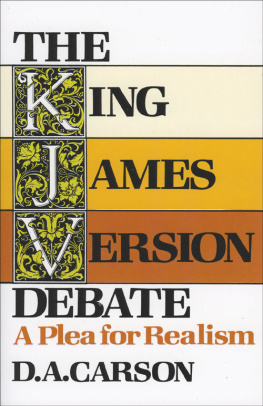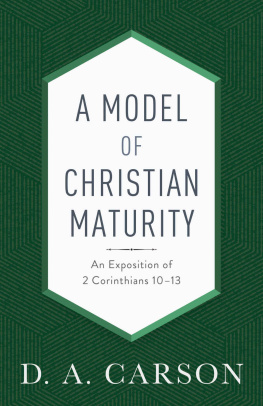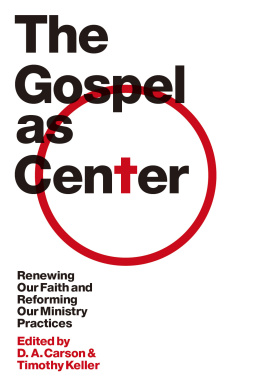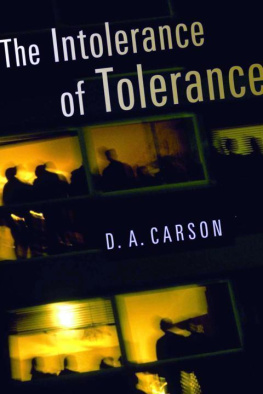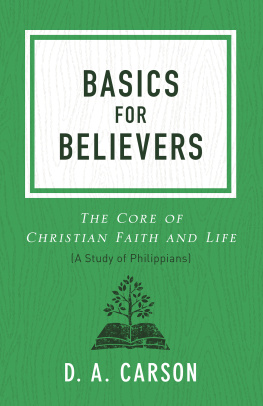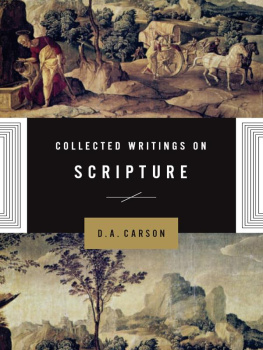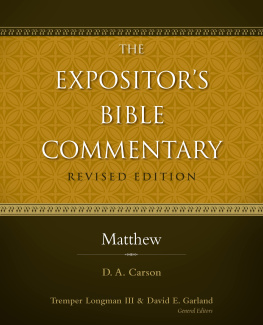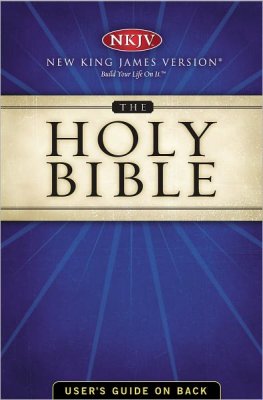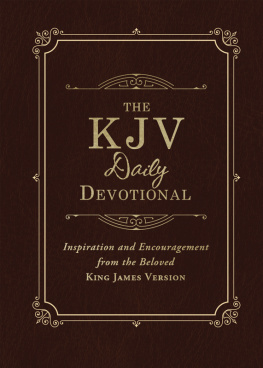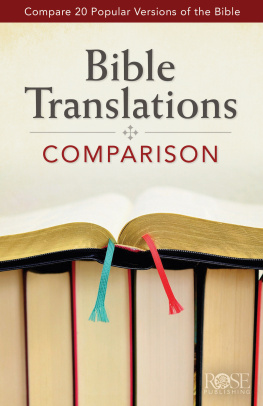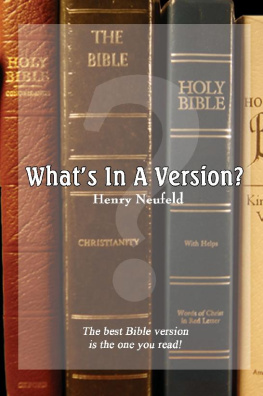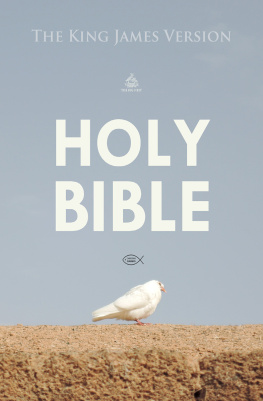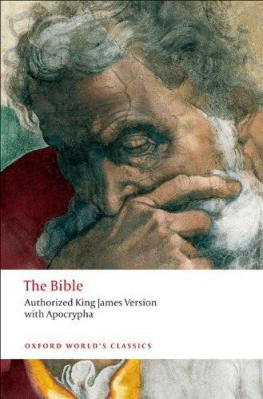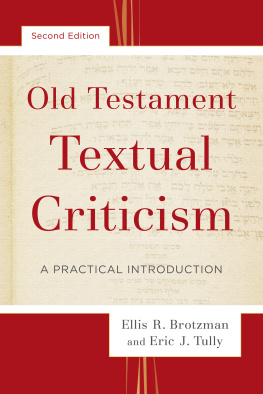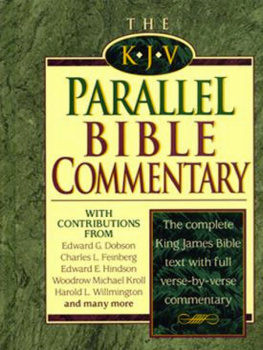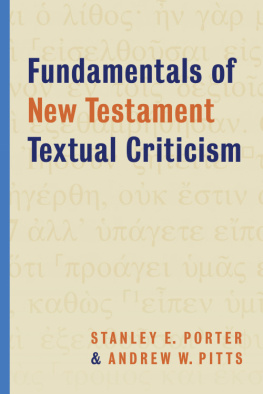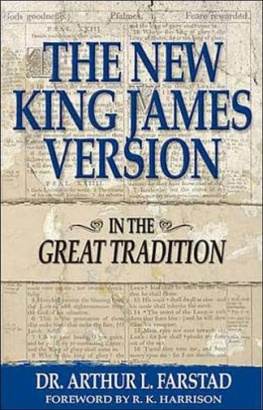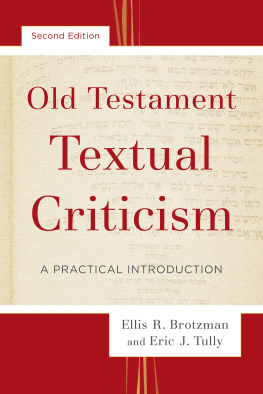
THE KING JAMES
VERSION DEBATE
THE KING JAMES
VERSION DEBATE
A Plea for Realism
D. A. CARSON

Copyright 1979 by Baker Books
a division of Baker Publishing Group
P.O. Box 6287, Grand Rapids, MI 49516-6287
bakeracademic.com
Ebook edition created 2011
All rights reserved. No part of this publication may be reproduced, stored in a retrieval system, or transmitted in any form or by any meansfor example, electronic, photocopy, recordingwithout the prior written permission of the publisher. The only exception is brief quotations in printed reviews.
ISBN 978-1-5855-8543-4
Library of Congress Cataloging-in-Publication Data is on file at the Library of Congress, Washington, DC.
Scripture quotations are from The Holy Bible, English Standard Version, copyright 2001, 2007 by Crossway Bibles, a division of Good News Publishers. Used by permission. All rights reserved.
Unless otherwise indicated, all Scripture quotations are from the Holy Bible, New International Version. NIV. Copyright 1973, 1978, 1984 by Biblica, Inc. Used by permission of Zondervan. All rights reserved worldwide. www.zondervan.com
Contents
This little book is not the sort of thing I like to write. Yet for a variety of reasons I have been called upon again and again to say something about English versions of the Bible; and it has therefore been impressed on me repeatedly that a short volume on the subject, written at an easy level, was sorely needed.
Dr. H. H. P. Dressler and Dr. J. B. Richards read an earlier draft and offered some helpful corrections, and I am grateful. Mr. Larry Perkins has been of the greatest assistance, and his advice most enriching. None of these men, however, should bear the brunt of whatever criticism the following pages evoke. My warm thanks, too, to Diane Smith and Pat Doidge, who reduced a messy manuscript to neat typescript.
Soli Deo gloria.
D. A. Carson
Vancouver, B.C.
Thanksgiving 1977
BanT | The Banner of Truth |
Bib | Biblica |
BJRL | Bulletin of the John Rylands Library |
BT | The Bible Translator |
CT | Christianity Today |
EQ | The Evangelical Quarterly |
ET | The Expository Times |
JBL | Journal of Biblical Literature |
JETS | Journal of the Evangelical Theological Society |
KJV | King James Version |
LB | The Living Bible |
LXX | Septuagint |
MLB | Modern Language Bible |
ms(s). | manuscript(s) |
NASB | New American Standard Bible |
NEB | New English Bible |
NIV | New International Version |
NJT | Northwest Journal of Theology |
NTS | New Testament Studies |
NWT | New World Translation (used by Jehovahs Witnesses) |
ODC | The Oxford Dictionary of the Christian Church, 2d ed. |
RSV | Revised Standard Version |
RV | Revised Version |
TB | Tyndale Bulletin |
TEV | Todays English Version |
TNTC | Tyndale New Testament Commentaries |
TR | Textus Receptus |
WTJ | Westminster Theological Journal |
ZNW | Zeitschrift fr die neutestamentliche Wissenschaft |
Three historical realities make the topic I have chosen a hot one. The first is that the sixty-six books that make up the canonical Scriptures stand at the heart of Christian faith and practice. Christians everywhere recognize that discussion which touches these Scriptures touches a vital part of their faith; indeed, perhaps the most vital part. The second historical reality is the religious history of the church during the past two centuries. That history is bound up indissolubly with the way the Bible has been viewed. Evangelicals have therefore been sensitized to any deviation from an orthodox doctrine of Scripture; but some in their zeal have erected a fence around Christian Torah and seen deviations even where there are none. The third reality is the proliferation of modern English versions.
Evangelical reactions to modern English versions have varied from unqualified praise to equally unqualified condemnation. Both extremes are unjustifiable. Modern translations and modern paraphrases ought not be lumped together as if they were all of a piece.
There has arisen a sizable and vocal body of opinion that defends the King James Version (KJV) as the best English version now extant. Some of these defenders merely argue strongly; but others have gone so far as to make the adoption of this view a criterion of orthodoxy. They dismiss those who dissent from them as modernists, compromisers, or dupes. I respect their desire to contend for the faith once delivered to the saints; but I disagree heartily with many of their conclusions and even more of their arguments.
Lest I be dismissed out of hand as another modernist, I protest strenuously that when I sign the thoroughly conservative Articles of Faith of Northwest Baptist Theological Seminary, I do so without the slightest reservation. Moreover, I am not penning a personal nihil obstat with respect to every English version. I myself have published criticisms of one or two contemporary translations; and subsequent study and reading have not changed these published opinions, although they may perhaps have altered some individual judgments.
The present slender volume is not an exhaustive treatise. It is not even a rapid survey of modern English translations of the Bible. That sort of book has already been written. Rather, these pages are given over to an easy introduction to two things: biblical textual criticism, that branch of biblical study which examines and correlates the manuscripts from which our English Bibles are translated; and some of the principles upon which translations are made. Moreover, with the possible exception of the appendix, this book aims at being minimally technical. It is designed for students, pastors, and laymen who have no personal knowledge of the primary literature, but who find themselves influenced by the writings of the Trinitarian Bible Society and parallel groups, and do not know where to turn to find a popular rebuttal.
Objections against abandoning the KJV fall into two classes. In the first, it is argued that the manuscripts behind the KJV are more reliable and stand closer to the autographs than does the textual tradition behind virtually all of the English versions since 1880. In the second class stand all those miscellaneous arguments that contend for the stylistic superiority of the KJV, or its appropriateness for worship, accuracy of translation, the ease with which it may be memorized, or the like. I shall treat these areas in turn.
Next page
